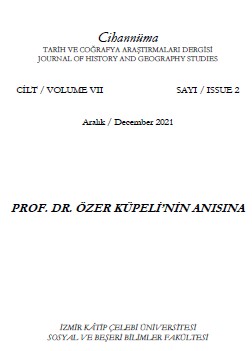MAİŞET VE MEVACİB : EGE ADALARINDAKİ OSMANLI KALELERİNDE GEÇİM MÜCADELESİ
LIVING AND SALARY: THE LIFE STRUGGLE IN THE OTTOMAN FORTRESS IN AEGEAN ISLANDS
Author(s): Orçun NalezenSubject(s): Economic history, 16th Century, 17th Century, The Ottoman Empire, Socio-Economic Research
Published by: İzmir Kâtip Çelebi Üniversitesi, Sosyal ve Beşeri Bilimler Fakültesi
Keywords: Aegean; Ottoman; fortress; salary; life struggle;
Summary/Abstract: In the article, the Ottoman castles in the Aegean Islands, XVI. century to the end of the XVII. It focuses on the livelihood struggle of the soldiers who served at the beginning of the century. A reaya who chose to serve in the castle was detached from all other professional and income-generating civil pursuits. Therefore, these individuals, who are part of the workforce and human resources of the region they work in, and who work in the castle, were withdrawn from the direct taxpayer people living in the area whose defence was left to the existence of the castle. The economic problems faced by the soldiers serving in the castles are discussed in this context. There were two main reasons for the financial problems experienced by the soldiers. The first of these was the rupture between military salaries and inflation, and the second was the income inequality caused by breach irregularities. In addition, the relationship between the reasons of the economic problems affecting the soldiers in the castle and the solution developed by the decision-makers against the problems experienced are revealed. The perspective on the root of the problems is discussed through the steps taken for the solution. Ottoman fortresses in the Aegean Islands served comprehensive strategic objectives pursued on the Mediterranean. Therefore, the solution of the material problems experienced by the soldiers was not only of humanitarian but also of military and strategic importance.
Journal: Cihannüma: Tarih ve Coğrafya Araştırmaları Dergisi
- Issue Year: VII/2021
- Issue No: 2
- Page Range: 253-273
- Page Count: 21
- Language: Turkish

